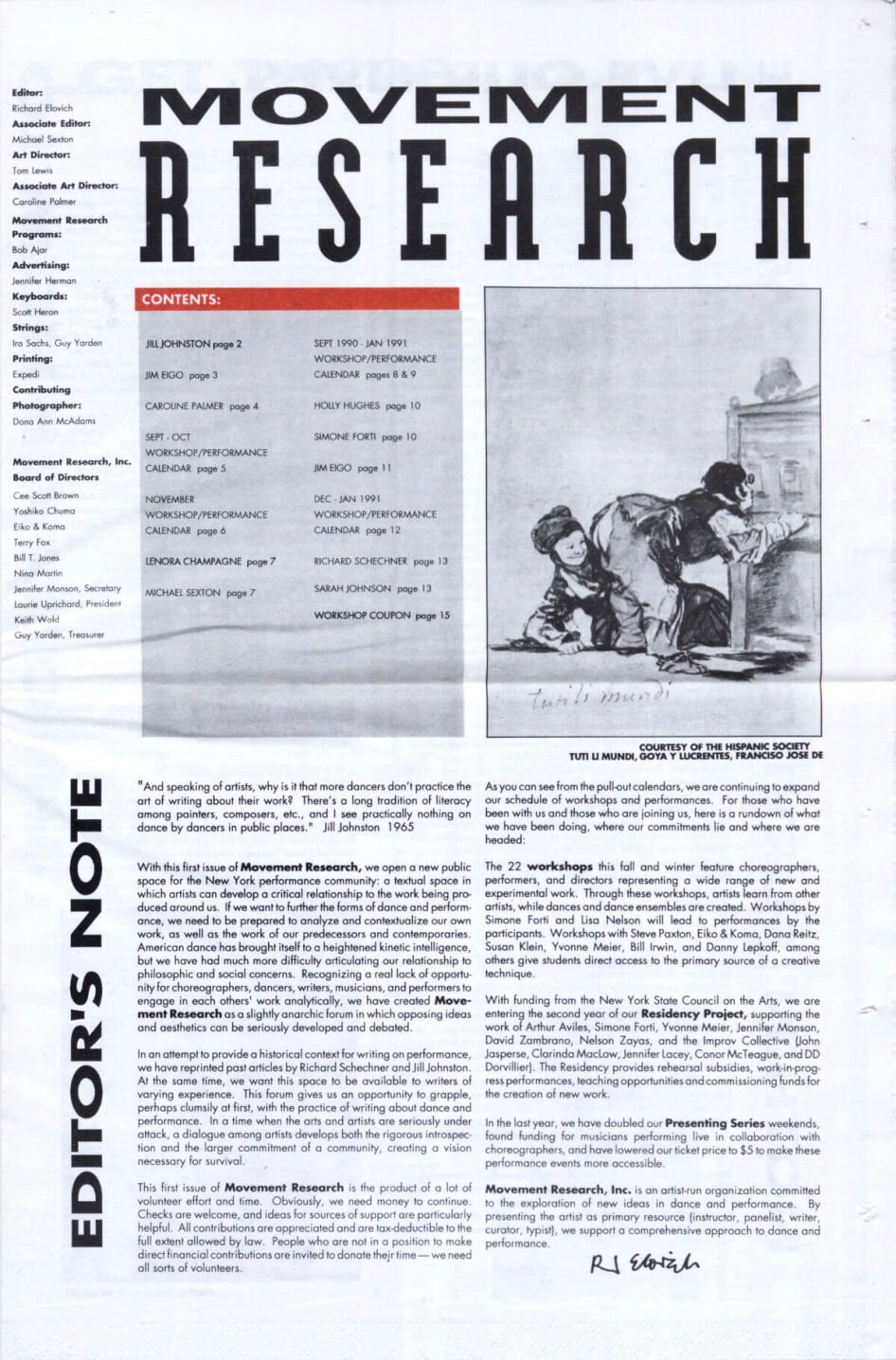Issue #01
Summer 1990

"And speaking of artists, why is it that more dancers don't practice the art of writing about their work? There's a long tradition of literacy among painters, composers, etc., and I see practically nothing on dance by dancers in public places." Jill Johnston 1965
With this first issue of Movement Research, we open a new public space for the New York performance community: a textual space in which artists can develop a critical relationship to the work being produced around us. If we want to further the forms of dance and performance, we need to be prepared to analyze and contextualize our own work, as well as the work of our predecessors and contemporaries. American dance has brought itself to a heightened kinetic intelligence, but we hove hod much more difficulty articulating our relationship to philosophic and social concerns. Recognizing a real lack of opportunity for choreographers, dancers, writers, musicians, and performers to engage in each others' work analytically, we have created Movement Research as a slightly anarchic forum in which opposing ideas and aesthetics can be seriously developed and debated.
In an attempt to provide a historical context for writing on performance, we have reprinted past articles by Richard Schechner and Jill Johnston. At the same time, we want this space to be available to writers of varying experience. This forum gives us an opportunity to grapple, perhaps clumsily at first, with the practice of writing about dance and performance. In a time when the arts and artists are seriously under attack, a dialogue among artists develops both the rigorous introspection and the larger commitment of a community, creating o vision necessary for survival.
Editorial team
Editor-In-Chief
Richard Elovich
Associate Editor
Michael Sexton
Design
Tom Lewis - Caroline Palmer
Advertising
Jennifer Herman
Contributing Editor
Jim Eigo - Ira Sachs - Guy Yarden - Scott Heron
Photographer
Dona Ann McAdams
Articles
Editor’s Note
"And speaking of artists, why is it that more dancers don't practice the art of writing about their work? There's a long tradition of literacy among painters, composers, etc., and...
Nothin’ Survives But The Way We Live Our Lives
(Excerpted from a review of Roaratio: An Irish Circus on Finnegans Wake, presented October 1986 at the Brooklyn Academy of Music. This was a collaboration between Merce Cunningham and John...
The Cure or How to Get There
MOUNTAIN-CLIMBER: (Quietly) O.K. Who wants to be cured? —Richard Foreman, SOPHIA=(WISDOM) : PART 3 Anthony comes to himself in the desert. Flaubert, and part of the "argument" of the Wooster...
Mining Personal History: The Re.Cher.Chez Experiment
Over sixty years ago Virginia Woolf called upon all women writers to embrace their tradition and continue producing work by securing fixed incomes and rooms of their own in which...
Notes on Content
Throughout the sixties and seventies, minimalism was a characteristic of post-modern dance and performance art. As Holly Hughes says, many performances "already looked like they were happening under glass." As...
Talk About Daring
Daring is a quality that all artists to some degree desire, but downtown, so-called experimental artists cultivate it by the acre. Daring. What is it besides an overused press-release buzzword?...
You Have A Gal in Kalamazoo
Recounts her experience performing "World Without End" in a conservative Midwestern town, the work's strong reception, and advocates decentralizing the art world to foster understanding and combat misrepresentation by figures...
Organic Telling
Joseph Campbell must have used the word consciousness, because Bill Moyers leaned forward, and with a wide eyed expression asked… What is consciousness? The two had been talking, just sitting....
Artwork/Aidswork—And Beyond
From theater and fiction writing to AIDS activism, Eigo describes leveraging his artistic skills toward activism.
“I Can’t Go On Like This..Well? Shall We Go?
Excerpts from THE END OF HUMANISM by Richard Schechner ( copyright 1982 PAJ Publications reprinted by permission of the publisher) Bleak. A theatre without a new generation of young people....
The Vocabulary of Improvisation
Written and discussed with the help of Barbara Hofrenning, Almon Grimsted, Jennifer Miller and Linda Austin There are some conditions inherent in an improvised performance that have promoted the cultivating...